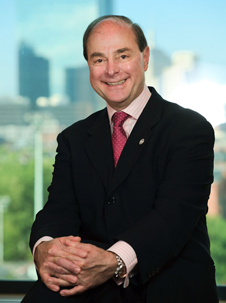
In his keynote address at the College Board colloquium, Northeastern President Joseph E. Aoun outlined how American Institutions can meet the challenges of the 21st century.
Higher education in America is at a watershed moment in history, in which U.S. institutions have a critical role to play in shaping the future and meeting new challenges, Northeastern University President Joseph E. Aoun said in his keynote address on Saturday at the College Board Colloquium in California.
“The stakes are high and the opportunity is great,” Aoun told an audience of 240 educators and administrators from colleges and universities nationwide and school district superintendents from the West Coast.
The annual event brings education leaders together for serious thinking and spirited dialogue concerning critical issues facing higher education. This year’s theme was “Embracing the ‘New Normal’ ” — and attendees praised Aoun for challenging educators to question historical assumptions of higher education and operate from a global perspective by searching for progressive models around the world.
As American institutions face growing challenges that include less government funding, more federal regulation and increasing competition abroad, Aoun said the U.S. is also in the midst of an “explosion of knowledge” that is generating new businesses and industries and shifting the needs of students.
To address this changing landscape, Northeastern has established a system of regional campuses across the country. Aligning Northeastern’s strengths with the demands of each region’s economy, the campuses will offer flexible, “hybrid” master’s degree programs that integrate both online and classroom learning, a global view and customizable curricula.
Aoun said the U.S. higher education system has thrived with an open, meritocratic, innovative and risk-taking model, as American universities entered into a social compact to educate students who go on to improve society through research and other avenues. But he said the challenges of the 21st century are forcing institutions to revisit this compact, in which colleges look beyond the traditional boundaries of place, and engage private and public partners to achieve these goals.
“This is the way American higher education needs to move forward in order to survive and to thrive,” Aoun said. The incorporation of experiential learning — a hallmark of Northeastern’s education model — is also becoming increasingly important to students by adding valuable, real-world experience.
Speaking of the globalization of higher education and the increasing demand for higher education worldwide, Aoun cautioned against the “gold-rush mentality” that often drives overseas campus expansion by U.S. institutions. Aoun quoted an education advisor to the Indian prime minister who said the American model of higher education, “is not scalable, not affordable, not sustainable and not adaptable.”
The colloquium continued on Sunday, as Aoun participated in a conversation about major trends affecting the direction of higher education and the challenges faced by individual institutions. The discussion included the presidents of the University of California, Spellman College and Columbus State Community College, as well as the College Board’s vice president for higher education relationship development.
The College Board is a nonprofit organization connects annually with more than 7 million students and their parents, 23,000 high schools and 3,800 colleges to provide a path for students to college opportunities.
Read more about the regional campus initiative
Northeastern University to establish system of regional campuses across the U.S.
Four College of Professional Studies master’s degrees to be offered in Charlotte
Joining Trend, College Grows Beyond Name
Northeastern University’s College of Professional Studies (CPS) is committed to providing career-focused educational programs that are designed to accommodate the complex lives of motivated learners. Offered in a variety of innovative formats, CPS courses are taught by accomplished scholars and practitioners who have real-world experience. The result is an educational experience founded on proven scholarship, strengthened with practical application, and sustained by academic excellence.
Northeastern University is a global university with a tradition of partnership and engagement that creates an innovative, distinctive approach to education and research. Northeastern integrates classroom studies with experiential learning opportunities in 70 countries, and pursues use-inspired research with a focus on global challenges in health, security, and sustainability.